Should a Zelda Movie Be Made?
Posted on March 29 2013 by Din Akera
 The topic of whether a Zelda movie would be a positive or negative idea is a major subject. I have seen more debates and threads on this topic than it’s possible to read. When I examined critically the process of creating a Zelda movie I quickly discovered that more questions were raised, rather than answered. Problems arose regarding decisions on plot sequence, length, format, budget, and many other incidentals. Walking through the process of making a hypothetical movie has allowed me to attempt to answer some of these questions and solve these problems. However, you will have different answers and solutions to these issues. By working together, we may be able to decide whether a Zelda movie is a good or bad idea.
The topic of whether a Zelda movie would be a positive or negative idea is a major subject. I have seen more debates and threads on this topic than it’s possible to read. When I examined critically the process of creating a Zelda movie I quickly discovered that more questions were raised, rather than answered. Problems arose regarding decisions on plot sequence, length, format, budget, and many other incidentals. Walking through the process of making a hypothetical movie has allowed me to attempt to answer some of these questions and solve these problems. However, you will have different answers and solutions to these issues. By working together, we may be able to decide whether a Zelda movie is a good or bad idea.
The audience carries the most weight in the production of any movie in the industry, and it’s a good place to start in attempting to answer the question of whether a Zelda movie is a good idea. It would be produced for an extremely wide audience. Zelda players range in age from as young as five to as old as sixty-five. These players also range in interests. What I love about the Zelda series may be very different from what you love about the series. Most pointedly, however, is the range of knowledge about Zelda that the audience would have. Pair this with a range of intensity of excitement and we have a very large audience. Therefore, it would be almost impossible to make a Zelda movie that the general audience, the fans, the theorists, and the fan boys and girls would all consider good, let alone “great”. The fact is, there will be a portion of the audience that will disapprove or be let down in some way.
For example, what would the story be? Adapting a video game to a movie takes a bit of tweaking because movies and games work differently. Movies are much more about plot than about interactivity, a game’s major focus. Making an interactive plot into a non-interactive one may result in an unenticing experience. Zelda games have plot, but which one would work best for a movie? Intense fans would most likely pick the one they considered the most central or the most relevant. Casuals would pick their favorite game or the only one they have played, etc. Or, should a movie instead be a large overview of the timeline? This option would satisfy more people in having their favorite plot covered, but that sounds more like a lengthy series than a single movie. Or, finally, should the movie be a completely new plot, as if it was a new game release? This option dispels the issue of choosing one, but would probably be the least appealing to Zelda fans as the familiar plots or characters they love may be absent. The most obvious choice would be to use the plot of the series’ most famous game, Ocarina of Time, because of the scale of audience it would reach. That game has one of the largest fan bases and the title of “the greatest game of its time” and “the greatest of the series”. However, those opinions are not held by everyone. Some fans would argue that it is not the best game and the movie should be based largely on The Wind Waker, Twilight Princess, or even Skyward Sword. No matter which is chosen, someone will be disappointed.
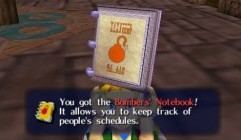 It would also be essential for the plot to not simply become a run through the game. If the movie followed the game too closely, it could bore the audience and make them ask the question: “Shouldn’t I just play the game?” Additionally, many fans would want to see their favorite sidequest(s) from whatever game was eventually chosen. Iconic examples could include Anju and Kafei’s quest from Majora’s Mask, The Happy Mask Shop quest from Ocarina of Time, a trading sequence, or any of the various item collecting quests. This dilemma puts us right back to square one; which sidequests should be shown in a movie? How do you determine which ones are best? Is it possible to include them all?
It would also be essential for the plot to not simply become a run through the game. If the movie followed the game too closely, it could bore the audience and make them ask the question: “Shouldn’t I just play the game?” Additionally, many fans would want to see their favorite sidequest(s) from whatever game was eventually chosen. Iconic examples could include Anju and Kafei’s quest from Majora’s Mask, The Happy Mask Shop quest from Ocarina of Time, a trading sequence, or any of the various item collecting quests. This dilemma puts us right back to square one; which sidequests should be shown in a movie? How do you determine which ones are best? Is it possible to include them all?
This last question brings us nicely to the final point leading to my decision on the plot. How long will the movie be? If it includes the entire plot of a single game and all of its sidequests, the movie will be awfully long. Fans of some series have no problem with this, sitting through three hours of The Lord of the Rings, or whole day marathons of Star Wars, Pirates of the Caribbean, or Harry Potter. But I don’t believe very many members of the audience would elect to accompany us at a three hour Zelda movie. This narrows the audience, and loses money for the moviemakers, something most companies shy away from. The newest solution for this problem, however, is to break it into Part 1 and Part 2, as done with Twilight: Breaking Dawn and Harry Potter And The Deathly Hallows. This solves our length problem, but contributes to budget problems that I’ll discuss later. If attempting to do the entire game series, a TV series might almost be a better solution, but that simply tells us the movie is a bad idea; just do the series.
My answers to these questions would be to focus on the plot of Ocarina of Time with a couple sidequests that fit in with Link’s various stops throughout the regular plot and include all dungeons. I could deal with a three hour Zelda movie, so we will follow The Lord of the Rings’ example and use this as our theoretical template to answer the rest of the issues.
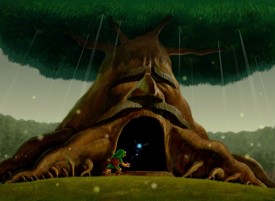 The second problem is related to the issue of plot: What do you do about dungeons and bosses? The plot cannot simply consist of going to each place and killing a big bad monster with little dialogue in-between. Yet, you could not remove this aspect, because the whole point of the dungeons and bosses portions of the games is for Link to prove himself worthy of holding the Triforce or whatever artifact or responsibility is thrust upon him in any game. Further, how in-depth should the story of each boss be? Though it was non-canonical, we learned in the manga an entire backstory about Volvagia. This added depth to the dragon’s battle and character to the boss. If this were done with each boss, plus the plot of the game, we lengthen the movie even more. Cutting temples and bosses would result in uproar that someone’s favorite temple was not included in the movie and also negatively affect a major part of the plot: Gathering the sages. I’m sure there would be many “how could they leave that out?” statements from fans, along with “why did they put that in instead?” Again, this goes back to my “you will not please everyone” comment. Depth would be great; most Zelda fans love depth, which is why some of us play the games, but the length would become a problem. However, if there were no depth at all, complaints would arise about the point of it all, which I would be a part of.
The second problem is related to the issue of plot: What do you do about dungeons and bosses? The plot cannot simply consist of going to each place and killing a big bad monster with little dialogue in-between. Yet, you could not remove this aspect, because the whole point of the dungeons and bosses portions of the games is for Link to prove himself worthy of holding the Triforce or whatever artifact or responsibility is thrust upon him in any game. Further, how in-depth should the story of each boss be? Though it was non-canonical, we learned in the manga an entire backstory about Volvagia. This added depth to the dragon’s battle and character to the boss. If this were done with each boss, plus the plot of the game, we lengthen the movie even more. Cutting temples and bosses would result in uproar that someone’s favorite temple was not included in the movie and also negatively affect a major part of the plot: Gathering the sages. I’m sure there would be many “how could they leave that out?” statements from fans, along with “why did they put that in instead?” Again, this goes back to my “you will not please everyone” comment. Depth would be great; most Zelda fans love depth, which is why some of us play the games, but the length would become a problem. However, if there were no depth at all, complaints would arise about the point of it all, which I would be a part of.
For the Ocarina of Time example, I would include every dungeon by depicting Link entering them and making his way through their iconic portions, but not the entire layout of the dungeon. For example, the sinking ship in the Shadow Temple, falling through the spider web in Inside The Deku Tree, and dropping the large pillar to reach the boss room in the Fire Temple. I would include minimal backstory for each boss, but not go extremely in-depth.
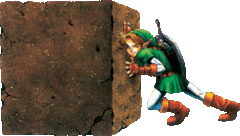 This problem includes puzzles as well. Should there be puzzles? How many? Puzzles are an integral part of Zelda; they have appeared in all of the games and have made their mark as a fundamental part of the series. Here is where making a game into a movie becomes tricky: Translating gameplay into film. How would you allow the puzzle portion of a movie to connect to an audience as it does in a game? There is dramatically less involvement in watching a movie than playing a game. If the viewer is unable to manipulate and do the puzzle, what is the point of putting puzzles in the movie? But if there were none, would it have a Zelda feel? It is very difficult to incorporate puzzles and even simple interactivity and immersion, innate with games, into movies. It is this difficult task of making movies seem interactive where I feel most movies-of-games fail. Link was originally designed to be the player; he was a nameless link, and you were supposed to be the one on the adventure. As you have no control over the movie, there must be extremely effective immersive situations for the connection to be established. Failing to create that sensation could absolutely break a Zelda movie’s success. Granted, some movies have had success in this area, Indiana Jones probably taking the award. Without a doubt, a sense of interactivity and immersion is essential to the Zelda franchise and must somehow be included in a hypothetical movie.
This problem includes puzzles as well. Should there be puzzles? How many? Puzzles are an integral part of Zelda; they have appeared in all of the games and have made their mark as a fundamental part of the series. Here is where making a game into a movie becomes tricky: Translating gameplay into film. How would you allow the puzzle portion of a movie to connect to an audience as it does in a game? There is dramatically less involvement in watching a movie than playing a game. If the viewer is unable to manipulate and do the puzzle, what is the point of putting puzzles in the movie? But if there were none, would it have a Zelda feel? It is very difficult to incorporate puzzles and even simple interactivity and immersion, innate with games, into movies. It is this difficult task of making movies seem interactive where I feel most movies-of-games fail. Link was originally designed to be the player; he was a nameless link, and you were supposed to be the one on the adventure. As you have no control over the movie, there must be extremely effective immersive situations for the connection to be established. Failing to create that sensation could absolutely break a Zelda movie’s success. Granted, some movies have had success in this area, Indiana Jones probably taking the award. Without a doubt, a sense of interactivity and immersion is essential to the Zelda franchise and must somehow be included in a hypothetical movie.
Unfortunately, this is one issue for which I do not have a conclusion. I would include iconic puzzles from the dungeons and overworld, but would be at a loss for how to make the audience involved in solving them. If you have an idea, I’d love to hear it.
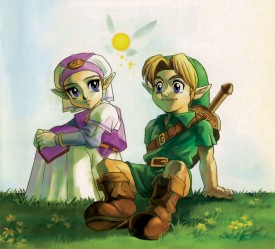 The point about “what makes a story Zelda-like?” is something that needs a lot of consideration. Is Zelda about a kid running around in a green hat trying to save the princess from an evil pig monster? Of course not; we all know there is much more to it in that. We know Link as the hero with a determination to help the people he meets, amazing puzzles, dungeons with creative items, and evil to be conquered! But how do you even remotely decide what should or shouldn’t be included from the franchise as a whole? This also extends to memes associated with series. The famous “Well excuuuuse me princess” is a great example. Should these small homages be included in the movie? Some fans will appreciate them, some will feel they are out of place, and newcomers will not understand the references. Would it create more problems to try and include things that “are Zelda”? This is an entire discussion in and of itself. I encourage research on this topic and acknowledge that everyone’s answer will be different.
The point about “what makes a story Zelda-like?” is something that needs a lot of consideration. Is Zelda about a kid running around in a green hat trying to save the princess from an evil pig monster? Of course not; we all know there is much more to it in that. We know Link as the hero with a determination to help the people he meets, amazing puzzles, dungeons with creative items, and evil to be conquered! But how do you even remotely decide what should or shouldn’t be included from the franchise as a whole? This also extends to memes associated with series. The famous “Well excuuuuse me princess” is a great example. Should these small homages be included in the movie? Some fans will appreciate them, some will feel they are out of place, and newcomers will not understand the references. Would it create more problems to try and include things that “are Zelda”? This is an entire discussion in and of itself. I encourage research on this topic and acknowledge that everyone’s answer will be different.
The next problem is what do you rate the movie itself? What age group should the movie be aimed at? Personally, I like a good action and gore movie. I’d love to watch Link blow up King Dodongo from the inside and slice through Ganon’s face for the final blow; more mature fans may enjoy a more violent movie. But as stated before, the broad audience would include many who would not enjoy that intensity. The games are not aimed at a mature audience, so I’m sure if a movie were made we would not see a high level of violence. However, the game does consist of some violence and so should the plot of a movie about Link fighting evil. Therefore, I believe it is appropriate to find some middle ground on this issue: The movie should be aimed at teenagers in terms of the violence and gore. I say this knowing full well that this choice will not make everyone happy, including myself; it would strike the best balance.
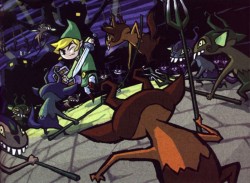 Perhaps one of the biggest issues is the question of who should be involved with the making of the movie. Should it be an independent party? Or should Nintendo play a large role in plot development, characterization, and all the other decisions that will come up? The film would not be canonical without Nintendo being highly involved, and even then I can see the potential for debates questioning a movie’s relevancy in theorizing. The non-canonical status of the movie may simply put Zelda fans off altogether. Even if Nintendo was involved to make “correct and canon” decisions, the movie’s relevancy may still be called into question by fans. Also, Nintendo makes games, not movies, so it could be a hindrance to have them so directly involved. As we discussed already, games and movies are quite different. Having an independent party could be beneficial not only because they’d know how to make movies, but they could also bring fresh and new ideas. Yet it could be catastrophic if they do not know all they should about the franchise in order for a movie to cater to fans who want a canonical plot.
Perhaps one of the biggest issues is the question of who should be involved with the making of the movie. Should it be an independent party? Or should Nintendo play a large role in plot development, characterization, and all the other decisions that will come up? The film would not be canonical without Nintendo being highly involved, and even then I can see the potential for debates questioning a movie’s relevancy in theorizing. The non-canonical status of the movie may simply put Zelda fans off altogether. Even if Nintendo was involved to make “correct and canon” decisions, the movie’s relevancy may still be called into question by fans. Also, Nintendo makes games, not movies, so it could be a hindrance to have them so directly involved. As we discussed already, games and movies are quite different. Having an independent party could be beneficial not only because they’d know how to make movies, but they could also bring fresh and new ideas. Yet it could be catastrophic if they do not know all they should about the franchise in order for a movie to cater to fans who want a canonical plot.
This question also slides into what should be done with production and graphics. Should the movie be animated? Entirely CG? Or live action? I would argue that for Ocarina of Time it should be live action with CG added for enemies and areas. But, if you chose any of the Toon Link games, it should be animated. I personally would desire an alignment with the graphics in the games, but to the fullest extent of our technology in those areas. The April Fool’s Day IGN movie trailer from 2008 is a fantastic example; the creators made very authentic sets and character designs. Having the right graphics designer, props and costume designer, and director would make or break the success of the movie with a Zelda fan, regardless of the quality of the script. I’ve had suggestions such as Neil Blomkamp for a more Indie-esque feel, or Michael Bay for the intense action. These two suggestions alone bring us back to the issue of everyone wanting something different out of a Zelda movie.
How about who should be cast for each role? Most fans have their own idea of what Link, Ganon, Zelda, and all the characters look like, or perhaps they picture something very similar to the game graphics. Not to mention the fact that, as described earlier, Link was originally supposed to be you; his character, as we know him now, evolved later. So how can you cast someone into a role that has so much history? If we choose to go the route of animation, this is less of a problem; designers can make Link resemble his in-game appearance.
As I am not very well versed in directors or actors, I would ask for qualities in these individuals rather than someone specific. Ideally, I would want a director well experienced in fantasy and action and experienced actors enthusiastic about playing such iconic characters. It would also be nice if they were Zelda fans, or at least players.
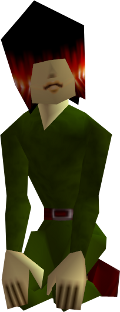 The last major issue I would like to address is the one most out of our control: Budget. According to the Motion Picture Association of America, the average cost of producing a Hollywood studio film in 2000 is 54.8 million, not including advertising and producing copies of the movie to be sold in stores. This money comes from a combination of the studio, the bank, investors, and insurance. Profit is then made off of sales at the box office. Though it is quite unclear how this money is collected and how much comes from where, I would assume it would be based on the faith in the movie’s ability to make money once released. This idea makes me very nervous about the prospect of a Zelda movie’s budget size. Though we may all hope for a Zelda movie one day, a movie studio might not believe the movie would make enough money, or that the fan base is large enough to turn a suitable profit. Returning to my statements about how wide the audience appears to be, I would hope to be able to prove them wrong. However, I would also presume that not all members of that audience would go to a Zelda movie in theaters due to their displeasure with the way it was done, or appears to have been done from the trailers. Furthermore, my statements about the audience were in reference to our large variety, not our large numbers. Franchises such as Call of Duty, Final Fantasy, and Grand Theft Auto have outsold The Legend of Zelda franchise by almost 50 million copies.
The last major issue I would like to address is the one most out of our control: Budget. According to the Motion Picture Association of America, the average cost of producing a Hollywood studio film in 2000 is 54.8 million, not including advertising and producing copies of the movie to be sold in stores. This money comes from a combination of the studio, the bank, investors, and insurance. Profit is then made off of sales at the box office. Though it is quite unclear how this money is collected and how much comes from where, I would assume it would be based on the faith in the movie’s ability to make money once released. This idea makes me very nervous about the prospect of a Zelda movie’s budget size. Though we may all hope for a Zelda movie one day, a movie studio might not believe the movie would make enough money, or that the fan base is large enough to turn a suitable profit. Returning to my statements about how wide the audience appears to be, I would hope to be able to prove them wrong. However, I would also presume that not all members of that audience would go to a Zelda movie in theaters due to their displeasure with the way it was done, or appears to have been done from the trailers. Furthermore, my statements about the audience were in reference to our large variety, not our large numbers. Franchises such as Call of Duty, Final Fantasy, and Grand Theft Auto have outsold The Legend of Zelda franchise by almost 50 million copies.
Going back to the length of our theoretical movie, assuming it takes $54.6m to create the average movie, we might have to increase the number a little due our added length of three hours. We should also factor in extensive graphics, as 95% of Link’s enemies and required locations will require some if not complete graphical additions. Further, we discussed doing Part 1 and Part 2 of Link’s adventure. So using Fellowship of the Ring as my baseline ($109m) we are looking at $220 million for our two movies, roughly of course. Unfortunately for us, I find it hard to see how very many major movie studios would be interested in forking over that much money to a potentially small audience, that may or may not be satisfied with how it is made, produced, and directed. Therefore, we must either cut back the quality of our movie or attempt to increase faith in the movie!
Now, I don’t want anyone to think that all hope is lost. There has been a trend lately in which many video games are being developed into movies. Examples: Pokemon, Resident Evil, Prince of Persia, Doom, Silent Hill, Max Payne, Hitman, Tomb Raider, House of The Dead, Alone in the Dark, Street Fighter, and Mortal Combat. With more promises on the way: Assassin’s Creed, Halo, BioShock and even Call of Duty. Unfortunately for our Zelda movie, most of the games listed above have a general commonality of action and violence and have ratings ranging from T to M. I do believe this is a trend because the studios believe these games have a fighting chance of having a larger audience with the more mature crowd. Zelda is on the line with this standard, having both some mature themes, but targeting younger audiences as well. As we discussed, we can make Zelda more mature by increasing the action and violence, and even put some more mature themes in, such as romantic sexual content. We can even change our theoretical game to Twilight Princess to accommodate the maturity, but that limits our playing field once again. By closing the door on the younger players of the series, which I believe outnumber the older ones, we lose a huge section of our audience. A Zelda movie might have a chance for production with fans pushing for it and the trend we are seeing with games being translated to films. Unfortunately, due to the other issues regarding a hypothetical movie, I would call that chance slim. However, I fear we will not have the audience to support the budget we need to have an outstanding film, and may get something underwhelming.
 Additionally, the relative failure of the 80’s cartoon and the live action Mario movie makes fans skeptical of the very idea of a Zelda movie. Interestingly, a poll done on The Escapist forums indicated that 64% of voters would not want to see a Zelda movie based on the cartoon. I thought that number would be a little higher myself. The overall failure of the cartoon I believe was based on very poor scripting, development on only single specific character traits in the three major characters, and average animation. The live action Mario movie fell into the trap I discussed earlier: It is difficult to make video games into movies because they function differently. Miyamoto’s views on the movie are representative of this problem: “The one thing that I still have some regrets about is that the movie may have tried to get a little too close to what the Mario Bros. videogames were. And in that sense, it became a movie that was about a videogame, rather than being an entertaining movie in and of its self.” The track record set by these two Nintendo screen productions is no doubt a factor in pursuing the making of a Hollywood Zelda film.
Additionally, the relative failure of the 80’s cartoon and the live action Mario movie makes fans skeptical of the very idea of a Zelda movie. Interestingly, a poll done on The Escapist forums indicated that 64% of voters would not want to see a Zelda movie based on the cartoon. I thought that number would be a little higher myself. The overall failure of the cartoon I believe was based on very poor scripting, development on only single specific character traits in the three major characters, and average animation. The live action Mario movie fell into the trap I discussed earlier: It is difficult to make video games into movies because they function differently. Miyamoto’s views on the movie are representative of this problem: “The one thing that I still have some regrets about is that the movie may have tried to get a little too close to what the Mario Bros. videogames were. And in that sense, it became a movie that was about a videogame, rather than being an entertaining movie in and of its self.” The track record set by these two Nintendo screen productions is no doubt a factor in pursuing the making of a Hollywood Zelda film.
The prospect of a Zelda movie is an enticing one for fans. The problem lies in the fact that every one of those fans has a different idea of what would make it a great movie. When the idea is put into motion, so many questions are raised, more than what would be desired for the typical production of a movie. I attempted to answer the questions to demonstrate just how complicated this process would be and discovered that it would be impossible to make the entire audience of the movie happy, particularly due to the wide variety of expectations from fans. The sheer excitement from fans who have not thought all of these questions through at first makes the prospect of a Zelda movie seem enticing. But after careful consideration unearthing so many uncertainties about a film, I am nervous to see a movie created. I personally am known for liking movies just for their concept, even if the movie is done poorly. I am not sure, however, if the general fan base would feel the same should a potential Zelda movie not be up to their standards. I feel that the uncertainties of a Zelda movie far outweigh the realistic prospect of such a production. However, I encourage you to answer these questions for yourself and decide if you believe something different than I do. Do you believe a Zelda movie should be created? Let me know in the comments.



